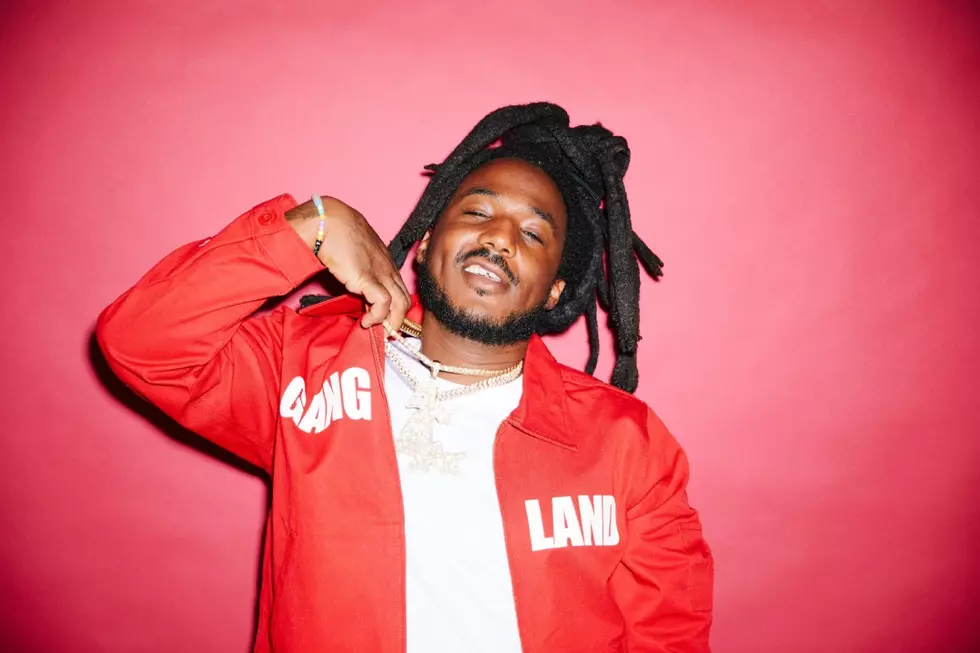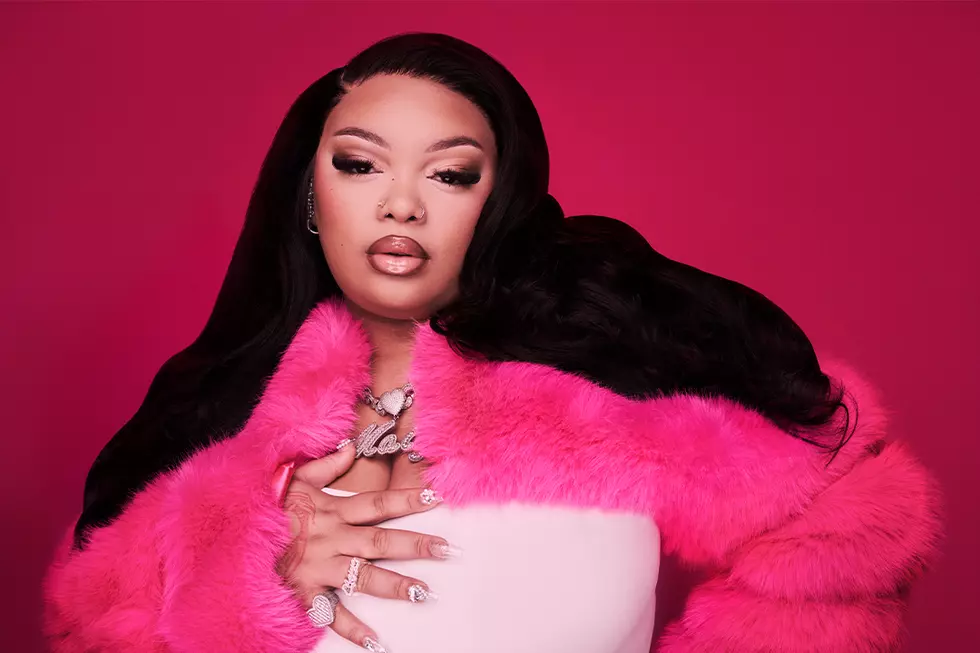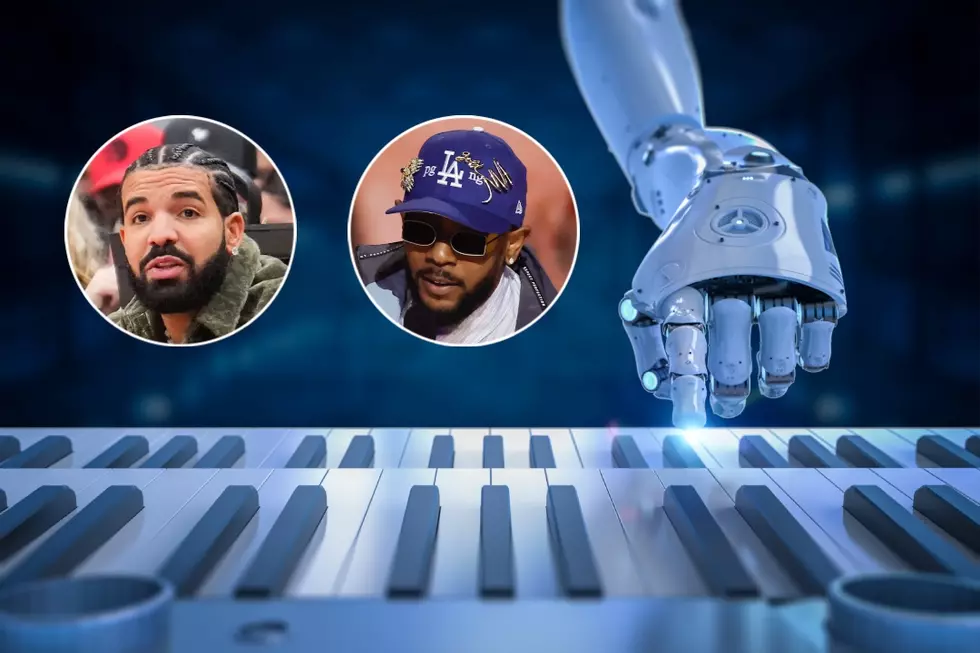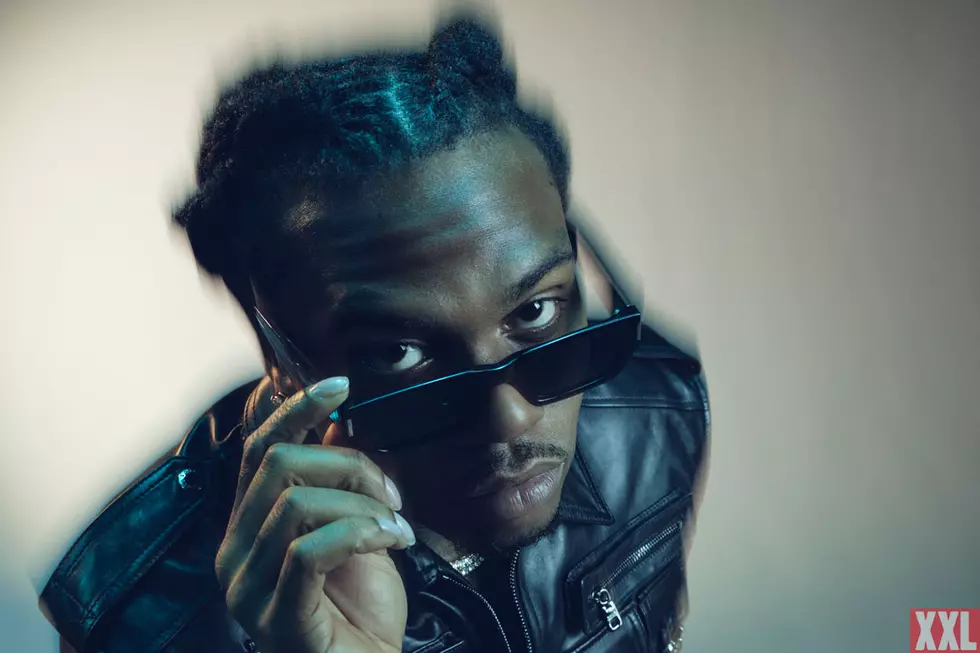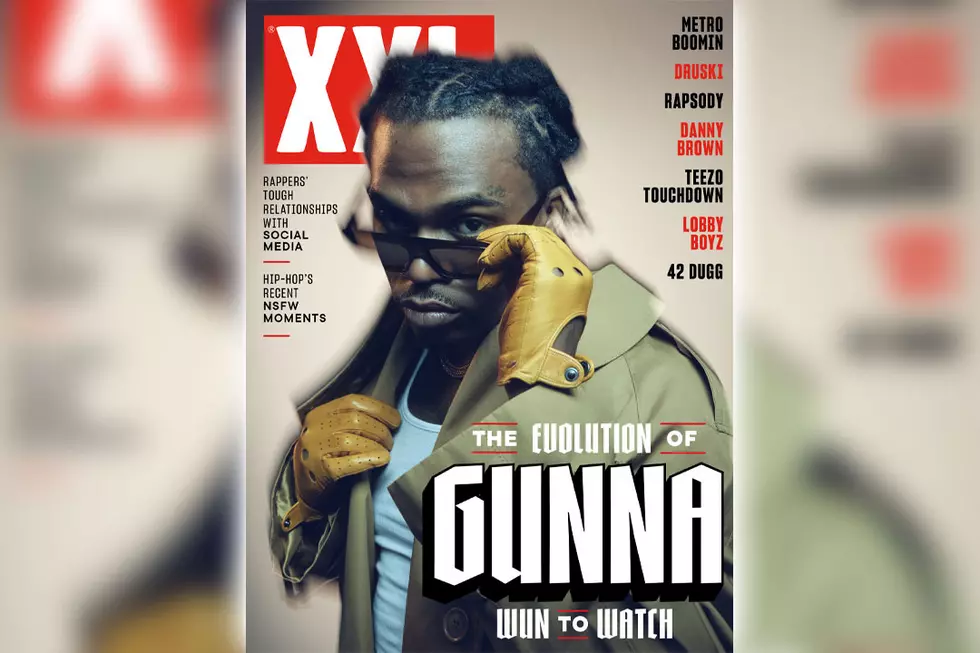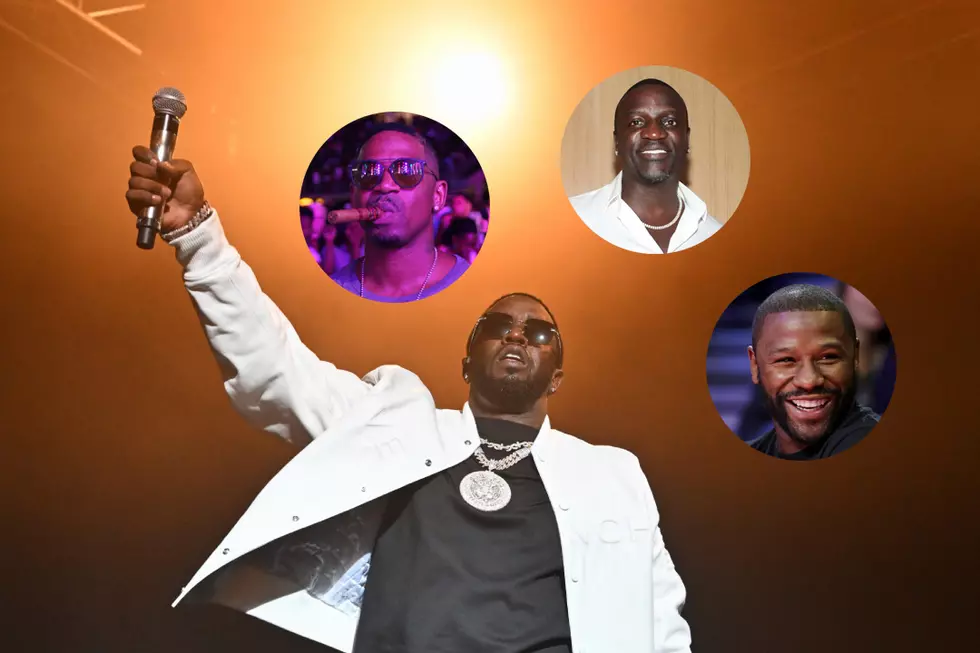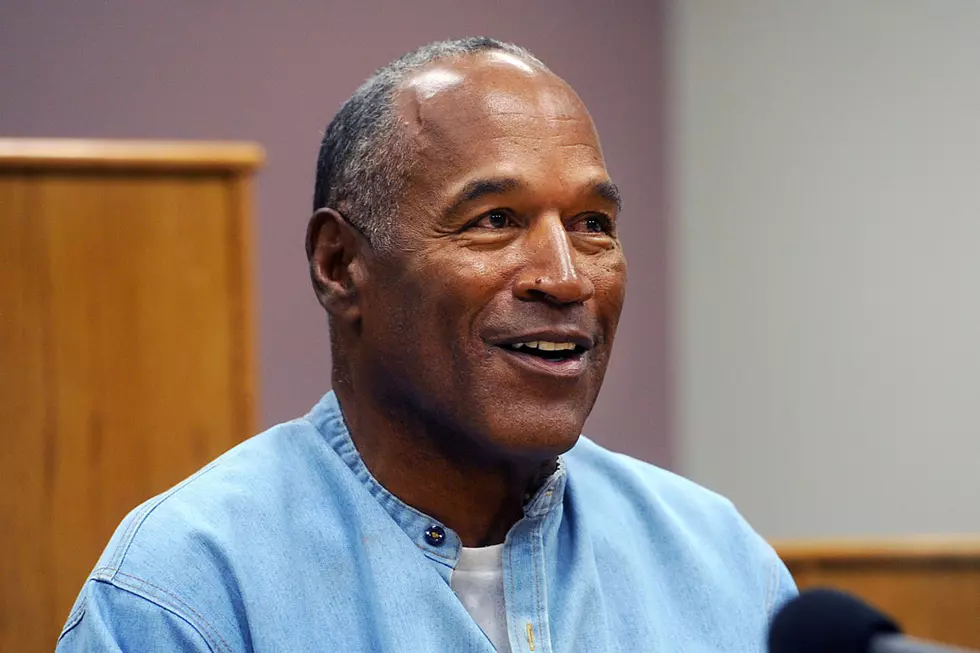
Trinidad James and Futuristic Keep It Real on ‘Independent’ Web Series
Innovative platforms that help hip-hop evolve and shed light on the music and lifestyle are always welcome, whether they're presented via TV, online and beyond. Stage 13, the home of rap's latest web series, Independent, looks to step into that realm with a show detailing the life, times and grind of an indie rap artist while stripping away the glamour and glitz. The result is a 12-episode short form digital series, accessed through Stage13.com, Facebook and YouTube, that gives an authentic glimpse at what it takes for an artist to survive without the backing of a major label.
Formed as part of Warner Bros. Digital Networks, Stage 13 prides itself on being a place that reaches "young, interesting people with a point of view, people with stories to tell, emerging voices, young filmmakers." They aim to accomplish that mission through the lens of hip-hop.
The Independent cast includes former XXL Freshman Trinidad James, who continues his quest for rap immortality after breaking ties with Def Jam; Arizona rapper Futuristic, L.A. native Reverie, and blue collar spitter Sean Brown. Independent examines the various vantage points of being a DIY artist. Whether it be that of someone with experience with the majors, to those looking to break through the glass ceiling that will allow them to make a comfortable living off their music, Independent covers the gamut of the indie hustle.
XXL sat down with cast members Trinidad James and Futuristic to get details on their experiences filming Independent, being indie artists, why the show is a must-watch for all artists, and what their fans can expect from them musically moving forward.
XXL: The two of you are featured on the web series, Independent. What's the premise of the show?
Futuristic: Basically, Independent, it's like a web series where it just looks behind the scenes at what all independent artists have to go through and what they do to get their product to the public. So, it's a dope way that fans can relate and fans can see the hard work and the whole process of something, as far as making merch and the places we came up from and rehearsals and lighting and everything that goes into the stuff that they get to see, they can see the behind the scenes of all that.
Trinidad James: Just in general, it just shows you the real. Each person's perspective of being independent is, like, a genuine expression of what it is. For myself, I've done the independent labels, the major label, a mixed minor-major type of label, and now I own my own label. Reverie, the female artist that's on the show, she's performing all over the world and I don't think she's ever signed a deal or anything like that. Her merch game is crazy.
Each person comes with a different power or strength that they have that's very important. Like, my merch game is weak, her merch game is amazing, but I've also had different types of success or whatever. With Futuristic, it's kinda like social media presence is crazy and for someone who's never, from what I've seen, never had a deal or any weird, viral sensation, that's literally just working, working to build my brand. It shows you that a Sean Brown, he speaks to that boy or girl that does everything, like, "I engineer, I rap, I can do it all, I need my chance, but I also have a real family and a kid."
You know, some people that rap, but rap's not paying their bills, with him it kinda gives you a feel of "Bruh, I rap to put baby food and Pampers on my baby." So it's a little bit deeper than "Oh, they're independent." It gives you the texture and the formula for being an independent artist.
How did the two of you get involved with the show?
Futuristic: I mean, they just reached out and pitched me the idea and when I heard the idea, I was like, this could be something that is really dope. And I had already known every other artist that was on it, too, and it just made sense.
Trinidad James: Just reaching through our agents and it made sense. At first, it didn't make sense. Like, at first, I didn't care. Stage 13 didn't exist so everything about this is new. So when something is new and it doesn't exist, it's very hard for me to take it serious because when you're grinding, especially when you're independent, time is definitely money. Time is important when you're independent and you're really doing this shit.
This gotta count ’cause I could've been in the studio. I could've traveled here and did a show, all these type of things. I could've went and got this bag. It gradually started making more sense and went from there, and now that it's out, it's making the most sense, like overall, for real for real.
What's the concept behind Stage 13?
Trinidad James: If I'm not mistaken, Warner Bros. never had a Stage 13 because it's superstitious. It's like on the elevator, it's not a 13th floor. So adding the Stage 13 was kinda like, this is like the rebel stage, you know what I'm saying? With shows where it's like, a little more edgier and a little more real because our show's not scripted. The facts I'm telling you are the facts I'm gonna tell my son, you know what I'm saying? Like it's facts. Like it's not like somebody wrote this and "Say it like this." Nah, ain't nobody tell me not to say shit.
Futuristic: I think that was part of it that made sense was the fact that we didn't have to go do anything that we weren't already doing. It was like they were following us in our daily lives and come and do a show and film it. Come into the crib and film it when I'm working and getting things ready for tour. So it was just super real.
So, it wasn't like a big change or adjustment for either of you?
Trinidad James: People need to see the behind the scenes of what it takes to really be independent. When you're recording the songs, doing merch and signing the contract or thinking about signing the contract, it's a thing. A lot of major labels got someone handling the contract, handling the merch, you just gotta handle the music. When you're independent, you literally wear all those hats at the same time. So, it's good to show that. That's what the show does; it shows you that.
Were the two of you able to build a camaraderie with each other and the rest of the cast throughout the filming process, or was everything done separately?
Futuristic: Everything was separately done. I don't even know if he remembers, I had met Trinidad at a video game competition like a year ago in L.A. and that was the only time I had ever met him and I don't even think he was signed up for the show when I originally signed up. Reverie, same thing. I had met her at a show, but during the filming of the show, we never linked up.
Sean was the only one that actually we linked up. I was on tour, so I had him come open up for one of my shows on tour, in Cali. So, we linked up through that, which was cool. But other than that, everything was completely separate. Like, I knew what was going on, so, it was cool to watch it now that it's done and see those different stories ’cause I knew everybody, but I didn't know the story like I know it now.
Trinidad James: Me and Reverie talk all the time or whatever, but I haven't met her. She sent me some music. We're supposed to link up when I get back to L.A. ’cause I just wanna help her out, just in general from a music side of stuff ’cause she inspires me from a merch side of things, you know what I'm saying? So I rock with her.
Futuristic, was there anything you took away from the other artists on the show or learned about yourself?
Futuristic: I think just basically, yeah, it's hard work, but this is really a blessing. We get to do whatever we wanna do, kinda whenever we wanna do it, however we wanna do it and it's a blessing. This is what I dreamed about when I was 6 years old, so, the fact I was in Mexico four days ago, now I'm in New York, then I'll be in L.A., I can do what I wanna do and I did it from the ground up and it's just a blessing.
A lot of people don't make it to even where Sean Brown is. A lot of people don't even make it there. Since the show, I moved back to Arizona and I've been going to a lot of events and I'm seeing the passion for people doing shows in front of 20 people, you know? So, it's like independent is from the ground up. It's so many levels to it and all of them are a blessing.
What would you say was the most emotionally raw moments that are captured in the show?
Trinidad James: I'ma go back to Sean, man. Sean just in general.
Futuristic: When he was talking about having to move out.
Trinidad James: It's crazy, like, it's real. The man really, like, grinding, dog, you know what I'm saying? I mean, I've always been a hustler before music so I can't really say that we're the same or whatever. Nah, that man grinding it up. I know people like him or whatever and they be grinding. They be super grinding, I understand what it is.
Futuristic: I would agree. His situation is the most raw and definitely tugs at your heart more than any of this because it's do-or-die. We all are set, for the most part, and with him, he's trying to get to the point where he's set.
Trinidad James: He loves the music, but he hasn't had a chance to let the music open up [things for him]. He can make beats and skits and all kinds of shit. That nigga is hard; he hard as hell.
Futuristic: And just being at that point in life is tough because it's the point where you have to consider a Plan B basically is the point that he's kind of at, especially with a family. And I remember being at that point, if this shit doesn't start paying off, what else am I gonna do? And I remember I gave myself, I was like, if I'm not on by the time I'm 25, then I'ma reevaluate, but until then, I'ma give it my all.
And my situation is different because I don't have a family, but for him, it's like he's at that point where it's do-or-die and it's just like one thing could change his life or it could be maybe he never breaks through that ceiling. You're watching it and you just want him to win so bad.
Futuristic, as a rapper from Tempe, Ariz., how does it feel to be a part of the thriving indie scene on the West Coast?
Futuristic: It's super dope. I think what's hella dope for me too is that everybody I once looked up to, because I didn't know independent rap was a thing. I didn't even know it was a thing until I seen Hopsin from Funk Volume, so, coming up, when I saw his stuff, I was like, whoa, this is kind of like what I do. And then I saw Machine Gun Kelly and I was like, whoa, this is kind of like what I do, and those are probably my two best friends in the industry and they show me mad love and we've done hella shows together.
So, it's cool to kind of look at people, see what they're doing and even, in some ways, improve on it. Funk Volume doesn't exist anymore, it's gone, but just seeing the things people did and being able to improve upon them. Being able to be cool with the people I looked up to and honestly just living the life I've always wanted to live and to help my homies live the life they've always wanted to live, my family, that's what I love the most about it. I have an artist under me now and I wanna bring more artists under me, so just being able to do what I want, how I want, when I want and being able to coach people through the same process.
How about you, Trinidad? How does it feel to be from the South and see that indie scene thrive?
Trinidad James: I mean, it's a blessing. At the end of the day, I want everybody to win. We all have a talent and if you make that decision with yourself to use your talent for the best, shit, I want you to win, I don't want you to lose. So, to answer your question, It's beautiful, like, those is my little bros, all those dudes. Before I did music, when I was in the street, I know people just coming to where I'm at ’cause I've sold clothes, I've worked in stores in the heart of the city, so I've dealt with everybody. I went to all different parties, hustled with all different kinds of cats.
Just in general, I'm a part of that Atlanta culture. Of course, there's some new guys coming up I never touched or never met, but I'm pretty sure I'm only, like, two steps from someone that knows me and knows you. So, at the end of the day, I'm proud of you. Always work harder, wake up every day wanting to be better and that's what's gonna make you what you need to be, period, you know what I'm saying?
I went and did what I had to do and "All Gold Everything" was amazing, but it was bigger than that just being amazing for me, it was to show you the things I did wrong, to do it better. That's what it's about. I don't get upset about that type of shit because I'm good. I call ’em caterpillars. I want the caterpillars to really be able to fly. Spreading your wings and not being able to fly is a torment. It makes people get depressed and kill themselves, all that type of shit.
When you learn from the mistakes or whatever, you spread your wings, boom, you graduating, fly and do it right. Fly the right direction, too. That's what being a big homie is. That's what a true big homie is, wanting to see the next caterpillars fly right. That's what I care about.
Futuristic, part of your fame came from being a promoter in addition to being an artist. Can you tell us more about that?
Futuristic: Basically, my come up came... I had an online come up and then I had an at-home come up. In Arizona, I was opening up for every single artist that came through, I was opening up and what I would do is, I would impress promoters ’cause I was selling 100, 200, 300 tickets to shows sometimes ’cause people knew me, but other times because I was going on Facebook event pages and writing everyone who said they were going to the event and saying, "I could sell you tickets for $5 cheaper than you can get them online for."
And I was just doing that, like, even without a car and I was just doing that and then it turned into where I had enough money that I started actually helping the promoters book the shows. Then I was bringing artists in and I was opening up for ’em. And then when I started touring, I was doing that out of state. I would book a show with somebody about my size in a different state and then I'd open up for them so no one would leave after they went on and that's how I booked my first tour. I'ma go here, here and here, but I'ma open up for ’em and then do that. That was the beginning stages of touring and doing shows and all of that.
How have your experiences as an indie promoter influenced your artistry or the way you approach the business aspect of being an artist?
Futuristic: I think when you're in any industry, you should know as much about it as you possibly can, so I can't get done on a show. Nobody can play me because if you try to play me, I'ma be like, "Yeah, right, give me my shit." I know what I'm talking about, I know what I'm doing. And a lot of times, I can do a lot of people jobs better than they can do their own job a lot of times.
Trinidad, you're the only artist on the show to deal with a major label. What are some of the biggest lessons learned or your biggest regret?
Trinidad James: I mean, I learned a lot, it was almost like college. It was like industry college, that's what a major is. It just reminds you, leaving it, how important it is that you don't stop working just because other people are working for you. You gotta work harder than them because at the end of the day, they just want layups. But you gotta bring the ball to the court, you gotta stretch, you gotta go through all those type of things. You gotta build the court or whatever because they want you to basically just throw alley-oops so they can just put the ball in.
A lot of times, if you don't know that, you'll chill or be thinking, they gonna pass me the ball, all I gotta do it shoot. No, they want you to pass them the ball. It's that kind of thing. And then you also gotta understand, one of the key things I learned is not taking my own money to pay for certain situations, waiting on the label to pay it. I got the money in my pocket, I should've just paid it, and I don't care if I don't make it back because the artistry is more important than making that money back or whatever.
The most important things about being an artist is the fans. Fuck the label, fuck family, fuck all of that. When it comes to your fans, anything that's hurting that is a cancer, cut it off, period. When you take care of them, they always gonna take care of you. If I'ma regret something, that's what I regret.
Would the two of you ever consider signing to a major label again and if so, under what circumstances?
Trinidad James: Well, I never say the word never because you just never know, but right now, no, there's no reason at all. I look at an artist like a Yo Gotti. Yo Gotti bought himself out of a deal a long time ago, almost a million dollars, like, "I'm out of this deal." Left that, revamped himself, been doing his thing, came back and was like, "I'ma go rock with Roc Nation, I'ma go rock with Jay," because he got older and got wiser.
Like Futuristic said, one of the key things is knowing the most about what you're doing to make your money and once you know enough. The second half of that is being a businessman. A true businessman does business with other businessmen, but when you come into the game, you're like a boy. You're not even a businessboy, you're just a boy, so you're a boy doing business with businessmen. If you don't got the right team, it don't make sense. But now, when you turn into a businessman, of course, you can come back and do business with business men, so that's kind of what the deal is. You never know.
Futuristic: Same thing. I'll never say never, you know, so the situation just has to be right. It has to make sense. And I think, most importantly, I think you just have walk in there with the music damn near already ready to go. Like Trinidad was saying, you already have the alley-oop ready to throw and they just have to catch it. You'll see it a lot of times now, people will sign where they already have a song that's super popping or something like that.
So, unless I had a situation like that, I don't think signing to a major just doesn't make sense ’cause at the end of the day, all that I really care about is my happiness and the happiness of people around me. So, if I look at a label where they're gonna control me so much to where I'm not gonna be happy or something like that, then I'm not gonna do it. I don't go into a meeting and I don't feel like everybody is really happy for me to be here everyone's stoked...it's even a vibe thing. Like, if i don't vibe with them, I'm not gonna do it. It just makes no sense.
Aside from the show, what other projects do the two of you have in the works?
Trinidad James: One of my artist, 31gramms, he was with me when we did Sway [in the Morning]. Killed Sway. Finishing up his project, putting that out. Music is something I do, so I got like seven projects waiting.
What's the next project you're planning on releasing?
Trinidad James: I'm probably gonna do a producer pack, and when I say producer pack, like a producer series. I got these different dope producers who I got whole projects with over their production so I'ma give you one at a time. I can roll it out in different ways, it's just that I be waiting on the right timing because my parent project that's out right now, Father Figga is doing a lot better than I expected to do.
And I can honestly say every project I've done this year has been solely independent where I did every aspect of it. Producers, beats, videos, business, marketing, merch, everything, so, I definitely learned a lot just from that. I've always done a lot myself, but I've always been kinda working with a label. I'm my own manager, too, so kinda working with a manager, so I'm literally doing everything myself this year. So, coming into 2018, it's about working smarter than harder. I did all these things myself. You gotta know everything so can't nobody pull wool over your eyes. Nobody can't try him on a show because he know's every aspect of a show. Can't nobody try me on how work a project or how to do a project because I know every stat that I got, all million views on YouTube and Apple Music.
I did that myself, I went and got that myself. So, if you can't do better, then I don't need you. It's nothing against you, I just don't need you, you can stay away from me. And I had to learn that for myself. So, coming into 2018, new project, Pitch Perfect 3, I'm in that—that's out now so that's a big deal. That's my first big major role; it's insane. I'm happy. And doing more film this year that I'm just working on, can't really speak on it, but we'll see, just keeping it open or whatever. I got some business ventures, I been coming to New York lately. I just got this crazy business idea that I kinda wanna do.
Fashion?
Fashion, honestly, I just like wearing clothes. Hopefully, I can turn that into a successful business when it makes sense, but I've blew a lot of money before trying to do clothes and I just had to realize I like clothes, I dress good, it doesn't mean that I can sell clothes to people [laughs]. So, when I really make sense of it or find that right team to make sense of it, I'm really building a dope team on that side of things. Just me and another person right now, but I'm not rushing it because there's so many other things going on, it just don't make sense.
How about you, Futuristic, do you have any upcoming projects in the works?
Futuristic: Man, this is like the longest I've went without putting out music so I'm sitting on like 60 songs right now so it's definitely a couple projects worth of songs done. We've just been thinking about the right way to put ’em out and it's been dope. The demand has been really high. Before I didn't let people breath and now the new fans I've gained have caught up so now I have two whole projects of music that are done, basically. [Editor's note: Futuristic dropped his new album, Blessings, on Dec. 25]
I'm partnered with the Phoenix Suns, which is really dope. I moved back to Arizona so I don't know if any other artist has done that, to where they're partnering with a team for everything.
My merch will be sold at the games, in the stores. I have the theme song with them, I'll be doing meet-and-greets at the game, halftime shows. I love basketball, I love music, so it's like my two favorite things in one and for my city, so that's hella dope. I have my clothing line, Sheeesh World, a store in the mall called Guest List. Just doing all that and kinda just using every platform to propel another one.
What are some of the reasons you feel Independent will resonate within the hip-hop community?
Futuristic: I think it will resonate on both sides. I think when artists watch it and people that do music or any creative art at all, they can relate just cause they're going through it or they already been through it, you know. Like, a major artist can watch this and be like, "I remember when I had to do that shit. I remember when I was doing it." ’Cause 99 percent of anybody that does any kind of art, at one point, it was just them doing it. Even if they were just the kid in their room drawing, at one point it was just you.
So, I think people will relate to it through that and I think people watching it will have more of a appreciation for things that they don't have. Like the person that has a 9-to-5 job, they don't necessarily understand. They're like, "They just make a show and make hella money." Like no, we do all this other stuff, we work more than you work. Like, you go to work, come home and you forget about work. We work all the time. We wake up out of our sleep on some idea shit. So, I think anybody and everybody that watches the show is gonna take something from it.
Trinidad James: I mean, for the most part, he summed it up or whatever, but the last thing I'ma say is fortunately thank God this show is using real people for it. That's it. It's real people, like, it's real. Every word, every fiber of the show, it's just real. It's giving you the real of what's going on, independently. Take it or leave it.
See 40 Hip-Hop Albums Turning 20 in 2017
More From XXL

